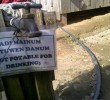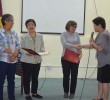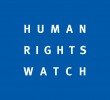DAVAO CITY — Lack of transparency and vulnerability to technical errors of the automated election has the Ecumenical Bishops Forum (EBF) Mindanao and Center for People Empowerment in Governance (Cenpeg) worried that the 2010 elections may be marred by electronic ‘dagdag-bawas’ (add and subtract).
The two groups held a briefing and orientation on the 2010 elections last November 3 to 4 to learn about the automated election system (AES) and found 30 vulnerabilities, including lack of testing, failure of revealing the source code, possible power and telecommunication failure, and its management of which the Commission on Elections (Comelec) has yet to address.
Some 46 priests, pastors, along with Catholic nuns from the regions of Davao, Socsksargen, Caraga, Northern Mindanao and Zamboanga attended the briefing, after which they committed to conduct voters’ education and to vigilantly monitor the election process to safeguard the votes.
�Imagine trusting the elections to machine as the Comelec wants us to do. A machine that has not undergone testing in actual conditions, where power failure and glitches are a high possibility,� EBF Mindanao coordinator Bishop Delfin Callao, IFI said in a statement released after the briefing.
EBF Mindanao has member churches from the United Church of Christ in the Philippines (UCCP), Iglesia Filipiniana Independiente (IFI), Methodist Church, Episcopal Church. The Sisters’ Association in Mindanao (Samin), an association of women religious, also vowed to support this action. The EBF also calls on people competent in information technology to help in educating the people on the automated elections.
Bishop Constante Claro of the UCCP also urged the public to safeguard their votes during the upcoming election and to monitor the Comelec actions on this AES. �We must make sure the elections push through,� Bishop Claro said.
EBF Mindanao also supports the Cenpeg’s call for the Comelec to address the technical and administrative vulnerabilities of the system.
Cenpeg fellow Professor Rosa Castillo from the University of the Philippines-Manila said the Comelec may make the public perceive poll automation will speed up counting and make elections free from cheating, but they are sacrificing transparency.
Castillo’s group also urged the Comelec to release the source code as mandated by the Poll Automation Law or RA 9369. The group said the source code, which contains the program that counts the votes, must be reviewed in order to see the correctness and security of the program. Cenpeg has now filed a petition of mandamus to the Supreme Court urging Comelec to reveal the source code.
For reference :
Bishop Delfin Callao,
EBF Mindanao coordinator.
Landline number (082) 300-5397
IMPORTANT NOTICE: INBOX is an archive of press releases, statements, announcements, letters to the editors, and manifestos sent to Davao Today for publication. Please email your materials to davaotoday@gmail.com. Davao Today is not responsible for the content of these materials. The opinion expessed in these items does not reflect those of Davao Today and its staff. Please refer to our terms of use/disclaimer.










